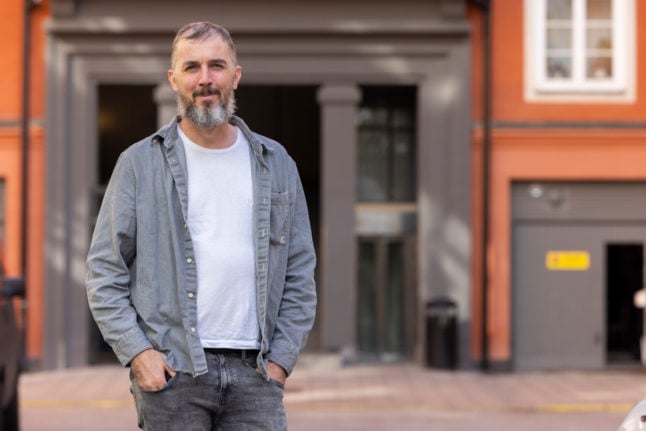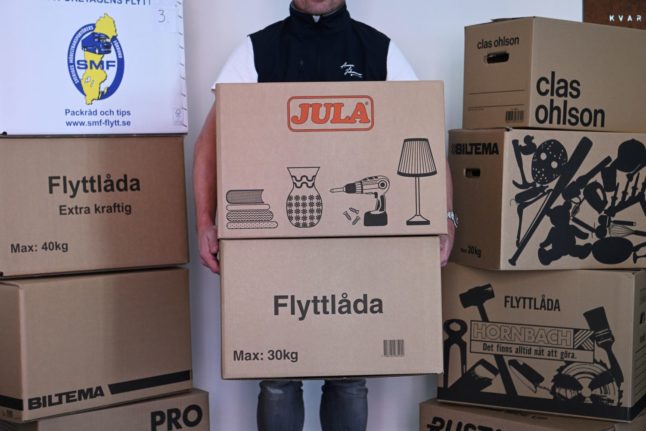When Philip walked into one of his favourite restaurants in Märsta, feeling nervous and somewhat guilty since he was going in to ask for a job, it went better than anticipated.
“I went in one night to ask for a job. I had been in there before, and I was kind of friendly with the two sons. I kind of felt embarrassed going in there and asking for a job because it really was the last chance saloon for me.”
But he didn’t even have to ask for the job himself.
“The eldest son said, ‘Oh, here, here’s a beer. I’ll be right back to you in a second’ and I went in there with my tail between my legs. He came out and said, look, normally I wouldn’t ask but I am desperate for somebody to work here. Could you possibly consider walking a few shifts here? I said ‘ah yeah, I’ll do you the favour’,” he tells The Local, laughing.
When Philip first arrived in Sweden in 1999, guitar in hand, he thought that a new country and atmosphere would give him the chance he needed to go further with his music career. However, a new issue appeared. One night when he got on stage he just froze.
“I went there to play in O’Connor’s pub out in Uppsala on the square and for the first time in my life, I got stage fright. I was standing there, and I didn’t understand what it was until years later.”
As he continued to work in the restaurant, his passion for creativity was still in the back of his mind.
With the experience he had writing for music magazines and working in local radio in Ireland, he started to apply for work in media companies. However, that proved to be more difficult than expected. Having gone through a long list of potential media outlets that could take him on for either work placement or for work, he received nothing back.
“There’s a big difference between Ireland and Sweden in terms of, in Ireland, if you have the gift of the gab, if you have the ability to talk your way into situations, you don’t need pieces of paper or anything else like that. If you just, fake it till you make it kind of thing, that works. That didn’t work in Sweden.”
CAREER TIPS:
He then took the opportunity to do an IT course at Komvux, Sweden’s adult education centre, which he used as a backdoor to get into the job he really wanted. Following the completion of that course, Philip, once again, set out to apply for jobs in media organisations and went through a long list. He had no luck until he got to the last name on the list, Reuters – the worldwide news agency.
“Talk about shooting at the moon. I sent off the email thinking, there’s absolutely no chance that these people are going to let me in the door.”
“About 10 minutes later, I got a phone call and they said, yeah, we need somebody to come in on work experience here to help out in the IT department.”
2002 and now working in the IT department with Reuters, it provided Philip with the perfect opportunity to work his way up. Just a few hours after starting his work experience, he was offered a part-time job with the company.
He went on to write a variety of articles within the IT department, which included, how to set up the computer, set passwords and how to store files. This then led him into writing news articles for the company.
“As long as you worked hard and you were in the right environment, people noticed, and I found that to be really refreshing. Because oftentimes you’ll find that you work hard and people either don’t notice or they don’t care or they’re happy enough for what you’re doing, and they just want to leave you there,” he says.
In 2006 he wrote sport-related articles for the news agency before later taking over the sports department at the end of the decade. This position was a freelance contract and required him to decide on whether to take it or not, but he jumped at the opportunity.
“The moment I was told here’s the sports, but it’s freelance, I said where do I resign. It was a case of going out the front door and coming in through the backdoor as a freelancer. So, I had to give up a sort of a permanent pensionable job with a company car to take a freelance contract and I don’t regret it for a second.”
READERS REVEAL:
After spending over two decades in Stockholm and continuing to work freelance, Philip now also spends his time trying to create a sense of community among the Irish population in Sweden.
Through his podcast, Irish In Sweden, he speaks to people with a variety of backgrounds, from those who are involved in the Irish societies in Sweden, to business owners, politicians and everyone in between. However, the definition of Irish is flexible, he explains, since there was a woman on the podcast who owns a bookstore in Gothenburg, but her parents are Irish.
“As long as those who have a story to share that would be of interest to the Irish listenership then they are welcome on the podcast,” he says.

He created the podcast as a time capsule which captures the lives of those with Irish links living in Sweden, noting that Ireland lost all records dating before the 1840s, when the Public Record Office of Ireland was burned in 1922 during the civil war.
“Who are we as an Irish community, pass that along to the younger generations, and just for them to understand, the culture, the way we speak English, it’s quite unique. We have our own language as well. To pass on all those things, and that perspective and history.”
In October 2022, Philip expanded his podcast offering by creating a global stage for the Irish around the world. The Global Gael podcast offers the opportunity for those who have gone on to do a wide variety of things, from journalism to sport and actors to ambassadors.
Creating a sense of community in Stockholm, not only for the Irish, is another task he aims to complete. He is able to do this through teaching kids how to podcast, from planning and preparation to recording. He has also coached soccer as well as Gaelic games, a sport native to Ireland and a cross between soccer and rugby, and he teaches Brazilian jiu jitsu at least twice a week in Jakobsberg.
Along with that he mentors young journalists both in Sweden and around the world, through helping them develop and opening doors for them.
“Many of them would be from a similar background to me – usually with an immigrant background and coming from a non-academic home and without the natural networks that might exist for people whose families have previously been involved in media,” he says.
“These are often the kinds of people that aren’t heard in media, and their perspective is vital to understanding who we are as a society, and where we want to go.”
“All of these things, it’s community,” he says.
He says the podcasts aren’t only engaging for Irish people, but also for others thanks to the diverse selection of topics discussed and the people who he interviews.
“The podcasts are what I hope and believe will be what I end up doing long-term, but building an audience is like going into battle every day – it’s a very competitive sector and people only have so much time and attention! That said, it’s a great medium and harks back to where I started in community radio.”



 Please whitelist us to continue reading.
Please whitelist us to continue reading.
Member comments